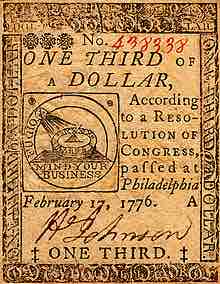The new Congress faced many issues during the American Revolution, including tensions with home governments, establishing legitimacy overseas, and funding a revolution without the ability to create money or tax citizens . War was also in the backdrop of the new government, and it had to move in the autumn of 1777 because the British invaded Philadelphia.

The Continental Currency
The Continental was a bill issued by Congress to fund the Revolutionary War. Over a very short period of time, the Continental became worthless.
Congress was moving towards declaring independence from the British Empire in 1776, but many delegates lacked the authority from their home governments to take such an action. Advocates of independence in Congress moved to have reluctant colonial governments revise instructions to their delegations, or even replace those governments which would not authorize independence. On May 10, 1776, Congress passed a resolution recommending that any colony lacking a proper (i.e. a revolutionary) government should form such. On May 15, Congress adopted a more radical preamble to this resolution, drafted by John Adams, in which it advised throwing off oaths of allegiance and suppressing the authority of the Crown in any colonial government that still derived its authority from the Crown. That same day the Virginia Convention instructed its delegation in Philadelphia to propose a resolution that called for a declaration of independence, the formation of foreign alliances, and a confederation of the states. The resolution of independence was delayed for several weeks as revolutionaries consolidated support for independence in their home governments.
The records of the Continental Congress confirm that the need for a declaration of independence was intimately linked with the demands of international relations. On June 7, 1776, Richard Henry Lee tabled a resolution before the Continental Congress declaring the colonies independent. He also urged Congress to resolve "to take the most effectual measures for forming foreign Alliances" and to prepare a plan of confederation for the newly independent states. Lee argued that independence was the only way to ensure a foreign alliance, since no European monarchs would deal with America if they remained Britain's colonists. American leaders had rejected the divine right of kings in the New World, but recognized the necessity of proving their credibility in the Old World. Congress would formally adopt the resolution of independence, but only after creating three overlapping committees to draft the Declaration, a Model Treaty, and the Articles of Confederation. The Declaration announced the states' entry into the international system; the model treaty was designed to establish amity and commerce with other states; and the Articles of Confederation established "a firm league" among the thirteen free and independent states. Together these constituted an international agreement to set up central institutions for the conduct of vital domestic and foreign affairs. Congress finally approved the resolution of independence on July 2, 1776. Congress next turned its attention to a formal explanation of this decision, the United States Declaration of Independence, which was approved on July 4 and published soon thereafter. The Continental Congress was forced to flee Philadelphia at the end of September 1777, as British troops occupied the city. The Congress moved to York, Pennsylvania, and continued their work.